Curtis Edmonds's Blog, page 7
December 9, 2020
The Political Spectrum
INFRARED – Although these “longer-wavelength” voters appear all but invisible in most polling data, they make up a surprisingly large part of the political spectrum. Key issues for voters in this demographic include supporting additional funding for high-tech communications links and night-vision goggles for police and military applications.
IMPERIAL RED – These highly conservative voters show unusually strong support for interventionist, internationalist foreign policy efforts. Favors an aggressive, expansionist model of projecting American power overseas, combined with advocacy for larger defense budgets and upgrades to the nuclear arsenal. Marketers target them for purchases of epaulettes, swagger sticks and patent-leather boots.
SANGRIA RED – These low-income Republican voters skew young and Hispanic, and support immigration reform, better treatment of migrant workers, and student loan relief. This demographic tends to favor cheap wine, organic fruit, and staying at home on Saturday night with friends and complaining about their finances instead of going out to clubs and drinking expensive whiskey.
BLAZE ORANGE – These independent voters support Democratic initiatives regarding infrastructure improvements and improving access to outdoor recreation areas. However, members are highly skeptical of gun control and oppose construction of new prisons. This demographic correlates strongly with hunting license renewal applications and venison sausage consumption.
TANGERINE – These independent voters tend to cluster in Florida and California and prefer their political rhetoric on the tangy side rather than the sweet side. They favor federal citrus subsidies, healthy snacking initiatives, and strengthening of US-Morocco ties.
HARVEST GOLD – These reactionary voters show intense suspicion of post-1970’s advances in home decor. Among all interest groups, these voters express the highest levels of concern with regard to higher gas prices, increased conflict with Iran, and the return of polyester leisure suits.
HEMP GREEN – These voters have been dominant in far-flung locations like Humboldt County, Colorado, Maui, and Oregon liberal arts colleges, and are a decisive demographic in Colorado and Washington. This demographic favors looser border controls and Medicaid funding for alternative and herbal medicines. Compatible with many other voters in different parts of the spectrum, including “Nacho Cheese Orange” and “Cool Ranch” demographics.
KELLY GREEN – These voters will act friendly for a while when you meet them in a bar, and will let them buy you a few drinks, but then will claim that they have a boyfriend waiting for them back at their apartment and won’t respond to your texts. And then they block you on Twitter for no good reason, except maybe that they’re just stuck-up because people have been telling them how pretty they are their entire lives, when they’re really just borderline attractive.
CAMBRIDGE BLUE – These voters went to school in England and won’t shut up about it. Typically have their diplomas, in Latin, tacked up to the wall of their office where you can’t possibly miss it. Known to wax poetic about the parliamentary system and HP sauce. Support neo-colonialist foreign policy positions and single-payer, government-operated health care.
MIDNIGHT BLUE – These voters are focused on putting in additional hours or working a second job to pay for student loans or credit-card debt. They typically get their news from late-night repeats of “Hardball with Chris Matthews” while going over balance sheets or contracts on their laptops. This group strongly supports the inclusion of over-the-counter sleeping aids in health care savings accounts, daylight savings reform, and tougher snooze-alarm regulations.
INDIGO – These environmentally and spiritually conscious liberal voters typically prefer natural dyes, folk music, and mystical exploration of the third chakra. Voters in this category are likely to come up to you at cocktail parties and ask if you can see their aura.
PLUM – These highly affluent liberal voters cluster in the mid-Atlantic region and tend to be either lobbyists seeking high-level government employment or government employees seeking high-level lobbyist positions. Sometimes found on college campuses, where they gravitate towards faculty senate positions and occasional stints as murder suspects. Upon retirement, demographically reclassified as “Prunes.”
ULTRAVIOLET – These “short-wavelength” voters tend to have high Vitamin D levels, cool sunglasses, and a higher incidence of skin cancer. Such voters support traditional environmentalist issues, but notably shy away from chlorofluorocarbon bans and other attempts to protect the ozone layer.
An Oral History Of Our Magazine’s Decision To Print The “Message From The Elder Gods” Advertorial
Sonia Greene, Editor in Chief: I want everyone to know that we didn’t solicit the advertorial. Nobody from this magazine went to the Lovecraft Institute and asked them if they wanted to do an advertorial. They came to us first.
Whipple Van Buren, Vice President for Business Management: We’re hemorrhaging money, just like every other publication. It’s not a secret. Advertorials are a no-brainer, as far as I’m concerned.
Sarah Phillips, General Manager: When we got the offer from the Lovecraft Institute, I wanted to turn it down. But they offered us three times our going rate. We’re skating on the verge of bankruptcy as it is, and we had the printer’s union breathing down our necks for concessions in collective bargaining. We didn’t really have a choice.
Dexter Ward, Shop Steward, Allied Printing Union, Local #1890: Oh, sure, they’re blaming all of this on the union. Typical. Did you ask them about their bonus structure? Anyway, this was management’s decision. We just print what they give us to print. We don’t ask questions. Well, maybe this time we should have asked some questions.
Arthur Jermyn, Account Manager: The guy from the Lovecraft Institute comes in the office, and he hands me this silver key. Very ornate, very elaborate. It’s carved with these words in this foreign language that I don’t even begin to understand. So I say, “This is nice, but where’s the content for the advertorial?” He breaks the end of the key open, and there’s a USB connector. “Just plug this in,” he says. That was good enough for me. He handed me the suitcase with the money inside, and he was gone.
Herbert West, Accounts Receivable: The suitcase turns out to be full of these gold coins with this weird image of the Flying Spaghetti Monster or something. I took them over to this cash-for-gold place, and they said they were for-real, and I was able to sell them for just about the amount that the Institute had agreed to pay. I didn’t think anything of it until later, when the blood started oozing out of the walls.
Erica Zann, Senior Art Director: I was very careful with the silver key. It just looked so odd. Beautiful, mind you, Compelling in its way. But it could have all sorts of weird viruses or Trojans or I don’t even know what. I plugged it in to an old computer that didn’t have any network connections. And then I looked at the advertorial. Sixteen pages, beautifully formatted, I looked over it, because when you get stuff like this from advertisers, there’s usually some sort of problem – spelling errors, margins out of place, stuff copied from who-knows-where. This was flawless. Unhinged, a little bit, I’ll grant you, but the design was incredibly well-done. Everyone who looked at it thought so–well, the ones who are still alive, that is.
Henry Armitage, former Associate Art Director, current resident, Arkham State Psychiatric Hospital: When I looked at the advertorial, THE SPIRIT OF YOG-SOTHOTH AWAKENED DEEP WITHIN ME, AND I BECAME COMPELLED TO DO HIS UNHOLY BIDDING.
Greene: We had the money in the bank, and the art department had signed off on the advertorial. So I approved it. You could tell it was a little odd, sure. To the extent that I thought anything about it, I figured it was some experimental fiction of some sort. People have spent money on weirder things, you know.
Phillips: I had the file with the advertorial, and I e-mailed it down to the print shop. It’s a routine thing, something I’ve done thousands of times. I had no idea that anything bad could happen.
Juan Romero, Senior Information Technology Manager: The first person to complain, if I remember right, was one of the receptionists. Some kind of weird virus. I kind of put it on the back burner until I got five different e-mails from people all over the office, complaining that there was some kind of unholy ten-armed octopus horror on their monitors. I told them to reboot, which seemed like a good idea at the time.
Ward: For whatever reason, the network problems were isolated to the upper floors. There wasn’t anything that kept us from printing out the advertorial. We started the run, and didn’t have any problems–in fact, we got it printed out and inserted in about half our usual time. That was weird, now that I come to think about it. It was though someone. or something, wanted us to get as many magazines with that advertorial printed and out in the world.
Van Buren: I was just sitting at my desk when my secretary walks by and says, “Zoth-Ommog! Zoth-Ommog! Prepare for the coming of Zoth-Ommog!” I thought it was a practical joke, so I asked her whether Zoth-Ommog had an appointment. Then she burst into flame. I knew then we had a problem on our hands.
Jermyn: Everyone was panicking. The break room was covered in this green goo. There were tentacles coming out of the air vents. I didn’t know what was going on, but I thought the Lovecraft Institute people had something to do with it. I called and got their voice mail. It said, “Press one to summon the dark spirit of Xalafu The Dread One. Press two to be devoured by a sightless white worm.” I hung up and ran like hell.
Armitage: HEED THE WORDS OF YOG-SOTHOTH. ALL MUST DO HIS BIDDING OR PERISH IN THE UNHOLY FIRES.
Romero: The problem was that nobody had ever taken a good look at the advertorial file. It had been originally designed in Microsoft XML. That should have told anyone who was looking at it that it was capable of great, great evil. Of course, nobody ever calls IT until there’s a problem.
Zann: I can’t tell you how it happened, not really, but all of a sudden I found myself, stark naked, sitting on the grass in the middle of Bryant Park, chanting “Janai’ngo, Janai’ngo, bring forth the Lobster of the Deep.” I’m just glad I wasn’t the only one, that’s all.
West: We ended up only having a third of our staff reporting permanent demonic possession. Everyone else either escaped in time or managed to throw off their psychic enthrallment to the various beings and demi-gods that inhabit the dread Cthullu Mythos. The building was a total loss, but insurance covered most of our losses and we got to write off a lot of old computer equipment. We probably broke even, although I hate to think of what our long-term disability liability is going to be.
Greene: I knew we had to get out an apology as soon as we could. In retrospect, I wish I had said something other than “On behalf of Gol-goroth the Malevolent, we deeply apologize for loosing the eldritch terrors of the Night-World on your fair city,” because I think that made things worse. You just don’t understand the reality of being possessed by the Old Ones until it happens to you personally.
Phillips: We’ve conducted a comprehensive review of our advertorial policy to ensure that nothing like that happens again. The last thing we, as a magazine, want to do is to injure our brand by putting out advertorials that cause mass panic and demon-possession, because that’s not good business.
Jermyn: Sure, we lost a lot of really big accounts over this. But you know, there’s a silver lining. All of a sudden, we’re starting to see new revenue sectors come in, catering to the newly-possessed. It’s kind of a niche market, but we’re taking advantage of it as best we can.
Zann: I still have the key. I keep it in a locked box at home. Every so often, it calls to me in a strange language, and I feel a strange compulsion to plug it in and see what happens. All that is keeping me from resurrecting the horror is fear, fear of the unknown, fear of the power of the Unnamed Ones that still haunt our world and our dreams. And because, let’s face it, it’s probably not a good idea.
Armitage: YOG-SOTHOTH IS THE GATE. YOG-SOTHOTH IS THE GATE. YOG-SOTHOTH IS THE GATE.
Occupy Leap Year
Okay, right from the outset, let’s get one thing straight. Nobody associated with this movement has said publicly that leap year is a tool of capitalist oppression. There are a lot of people associated with this movement—it’s a true, grass-roots, communitarian effort to promote a more human, more progressive climate for policy—and they have a lot of different views. Just because I, personally, happen to think that leap year is just another instrument of social control that the 1% use to enforce their agenda, well, that doesn’t mean that all of us feel that way. There have been too many cases where people have used the private views of one or two members to make the entire movement look foolish or naïve. The insidious distortion of the corporate media is almost as bad as the slander from the right-wing noise machine, if you ask me.
Besides, it’s not like anyone is consciously using leap year as a mechanism of social injustice. It’s more like nobody’s ever thought through all the implications in the modern era. Most people don’t even recognize that the calendar itself is a tool of the Western patriarchy. They start teaching you the days of the week in preschool, and you don’t ever even stop to realize how embedded it is in the culture. Even if we started calling it by its right name—the Gregorian calendar—that might make people stop and think where it came from and who started it. And like a lot of negative things, it comes out of organized religion.
For over fifteen hundred years, Western Europe had a secular calendar, developed by the Romans. Then Pope Gregory comes along and says, well, we can’t use the Julian calendar, because that means we can’t predict when Easter is. So the Catholic Church takes eleven days out of the calendar because the Pope didn’t want do something sensible like just decreeing that Easter was the first Sunday in April. That just shows you the conformity inherent in faith structures. And the Jesuits spread it all over the place, and that meant that local, culturally-relevant calendars in the Islamic world and the Far East were effectively supplanted by a Western import. The Catholic Church even pushed its calendar into the Protestant nations, although that took a couple of hundred years. It’s so warped that when Lenin and the Bolsheviks took over in Russia, the first thing they did was switch from the Julian calendar to the Gregorian—that’s why the October revolution actually took place in November. Some revolutionaries they were.
I mean, really, think about it. Every four years, we arbitrarily just say that February has twenty-nine days instead of twenty-eight. If you were trying to come up with something that ridiculous, you’d be laughed out of town. People would think it was a page out of The Onion or something like that. So the year is a little longer, and the big corporations get another day’s work out of their employees, and another day to bank their profits and fund misinformation campaigns to make it look like anyone who doesn’t go along with their worldview are a bunch of dirty hippies.
Of course, leap year in this country just happens to be in an election year. Don’t think that’s not a coincidence. In places where there’s a parliament that’s responsive to the voters, you know, you can have an election whenever you want, if the current regime isn’t following the will of the people. In England, the prime minister can call a snap election and have the whole thing over with in three weeks. But it doesn’t work that way in this country. It doesn’t matter how high the unemployment rate is, or how much they make in bonuses in the investment banks, or how the people are calling out for social justice. You still have to wait for the Tuesday after the first Monday in November of a leap year, and even then the regime doesn’t change until that next January. That’s pathetic.
You want to know who had the right idea? The French revolutionaries. That was a people’s rebellion like this one is, except they marched on the palace and arrested the king. They tried him for treason and chopped off his head. And once they got in power, they did not mess around, not one little bit. They took the Gregorian calendar and tore it up and replaced it with a decimal calendar. That’s twelve months with thirty days each, ten days per week, ten hours a day. That left five extra days a year—six in a leap year, of course—and they put those days in at the end of September and made them a national holiday. That’s the way that serious revolutionaries do things. Then Napoleon comes along and switches everything back.
Hope that cleared things up for you. Love to stay and talk, but there’s a tweet I got that said that somebody’s dad brought over a bunch of meatball sandwiches, and I better hurry and grab one before the homeless guys snag them all. Napoleon was a counterrevolutionary SOB, but he was right about the army traveling on its stomach, you know.
May 9, 2020
The Shadow of the Past: Historical Determinism in Modern Literature
Okay, right from the get-go, I have to apologize for the title, which sounds way more pretentious than I have any right to be. Stipulated. And I probably should get kicked out of whatever book-reviewer’s guild that exists for mashing up these two books, which have no real connection to each other than they came out at about the same time, and I was reading them at about the same time, and they both made me think the same thought about historical determinism.
I am also not using the term “historical determinism” in quite the right way, in the way that a historian would use it. In that manner, historical determinism is defined as a “belief that historical processes have a certain inevitability, based on some fundamental factor.” That, I think, is bushwa. It is the idea that, “well, of course Tom Brady engineered that last-minute drive, that’s what he does.” The lawyerly response to that is, “Objection. Assumes facts not in evidence.” Brady has engineered many fourth-quarter drives, but he’s fallen short other times; it’s not inevitable that he will succeed, and the data backs that up. (I am going to stop talking about Tom Brady now.)
No, I am using “historical determinism” in the way that an author writing historical fiction would, to mean that certain events happen in history that can’t be easily ignored or altered. If you are writing historical fiction about, say, the Battle of the Alamo, that historical fiction is going to have Travis and Bonham and Bowie and Crockett breathing their last. You can’t get around that, not even in fiction. The second you start doing that, you’ve either crossed the border into alternative history, or something else fanciful like time-travel literature. Either way, you’ve left historical fiction behind. (One of the great historical novels about the Texas Revolution, Not Between Brothers, by David Marion Wilkinson, illustrates what I am talking about here; his main character has the opportunity to go and fight in the Alamo, and — somewhat uncharacteristically — turns it down, for the fairly understandable reason that doing so would get him killed, and that would end the book too early.)
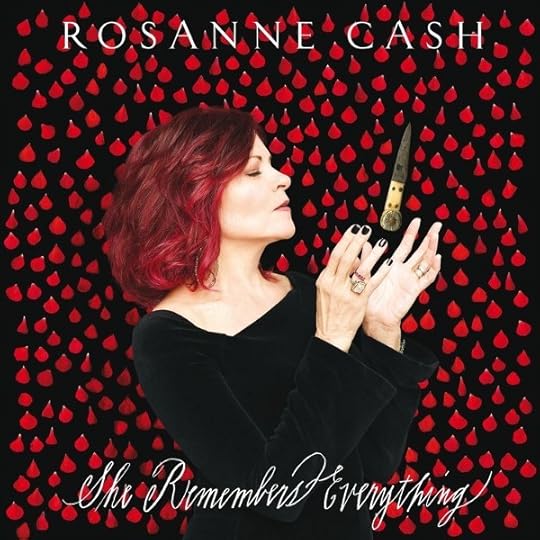
And, really, when you think about it, this sort of falls into the category of that’s too bad. Some years back, the super-talented Rosanne Cash wrote a bit for The New York Times — I looked, but couldn’t find it online — about a songwriting class she was teaching. A student would write a song, and Cash would suggest to them that they change the story of the song around in a different way. And the student would object, on the grounds of that’s not what really happened. The actual, real-life relationship ended in this certain way, and that’s what the song is about; you can’t just change it. And Cash’s response: of course you can. This is songwriting, not autobiography, you can do whatever you want if it makes the story better. But historical fiction doesn’t work that way, and it shouldn’t. And sometimes, from a storytelling perspective, that’s too bad.
The Mirror and the Light, the long-awaited third book in Hilary Mantel’s trilogy about Thomas Cromwell, is essentially a long journey towards a known end. Thomas Cromwell, after a long and colorful career, is executed on Tower Hill on July 28, 1540. If this is a spoiler for you for the book, I am very sorry about that, but it shouldn’t come as a surprise to anyone that the trilogy ends with Cromwell’s execution.
 Rylance is pitch-perfect as Cromwell; I can’t wait to see the next season.
Rylance is pitch-perfect as Cromwell; I can’t wait to see the next season.And, not to repeat myself, but that’s too bad. The secret to the three Cromwell books (Wolf Hall and Bring up the Bodies are the other two, all highly recommended, as is the BBC presentation featuring Mark Rylance, despite the horrid lighting) is not just that Mantel is a brilliant prose stylist (she most certainly is) but more that her Cromwell is such an amazing character. This line gets quoted in just about every review, but it’s just that revealing:
“He can draft a contract, train a falcon, draw a map, stop a street fight, furnish a house and fix a jury.”
I mean, you’d want the guy who was running the country to be able to do all that, right? Donald Trump couldn’t do any of that. (Joe Biden might have been able to fix a jury thirty years ago.)
Cromwell, of course, famously, has gotten a bad rap over the centuries as being Henry VIII’s hired thug. As Mantel not only features him in a positive light, but portrays him as much more of a modernist than ever he was, the tag of “historical revisionism” gets attached to the trilogy — Google “hilary mantel revisionist history” and you get 17,000 some-odd results, like this one:
Now, Mantel wants to rescue Cromwell from his bad reputation and tell his story, which is all very well, but she does distort the truth. What we get is a sort of propaganda, just as the 16th-century pro-Protestant Foxe’s Book of Martyrs was. We should think of Wolf Hall as fiction — even if it is entertaining fiction. — Andrew Browne, The Telegraph
Well, of course it’s fiction! Of course! That’s the beauty of fiction, you can write it however you please — even if it’s historical fiction. But what you can’t do is change the essential facts of history, and this is where The Mirror and the Light takes the form of a trap.
What Mantel has done is to create a character that is super-smart and intelligent, with a modernistic, pragmatic, Protestant outlook that is very familiar to the current-day reader, because it may be very much like our own, and endowed him with boundless wit, a good deal of empathy due to his rough upbringing and personal setbacks, and the gift of sprezzatura — the Italian art of making it all look easy. Mantel’s Cromwell has talked himself out of countless other problems; he has survived the machinations of Henry’s court so far, and has settled the hash of countless enemies.
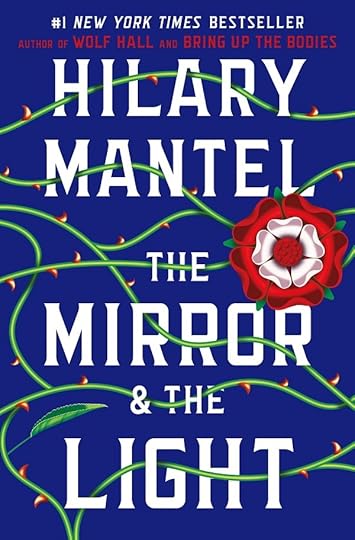 https://www.amazon.com/Mirror-Light-Hilary-Mantel/dp/0805096604/ref=tmm_hrd_swatch_0?_encoding=UTF8&qid=&sr=
https://www.amazon.com/Mirror-Light-Hilary-Mantel/dp/0805096604/ref=tmm_hrd_swatch_0?_encoding=UTF8&qid=&sr=And now he has to die. And not, you know, just your ordinary death — he has to be sent to the Tower to die for treason. And this has to happen. There would be, you would think, a hundred ways for someone who is as smart and powerful as Mantel’s Cromwell to avoid this; he can’t use any of them. Historical determinism says, sorry, you’re going to die, there’s no way around it.
From a literary perspective — and Mantel’s work is high-end literary fiction, make no mistake — this is fine. Mantel can get just as much mileage out of a doomed Cromwell, brooding in the Tower, begging an absent and silent Henry for mercy. But from a storytelling perspective, Cromwell’s end falls rather flat. Cromwell doesn’t die of hubris, or nemesis, or even something as simple as a political miscalculation. (I should amend that a bit by saying that treachery plays a role, but a small one.) The one thing that finally costs Cromwell his head — his arrangement for Henry to marry Anne of Cleves — is partly due to matters outside of his control (primarily the impulsive surprise that Henry arranges for their first meeting) and partly due to a seeming reluctance to reverse course. Someone as smart and resourceful as Cromwell, with the experience in managing Henry’s desires would — you would think — be able to recognize the danger and do something about it. But Cromwell doesn’t do that; he can’t. Historical determinism has him by the throat.

Historical determinism shows up in time travel, too, although not under that name. If a time-travel story is being honest with itself, it has to recognize that trifling with elements of the past can lead to disruptions in the future; the fading photograph in Back to the Future is a crude illustration of the basic principle. In the time-travel novels of Connie Willis, no matter how carefully you set your trajectory through the past, a mysterious unknown force called “slippage” keeps you from going to times and places where an unwary or malevolent traveler has the ability to muck up the future for good and all. So even if you wanted to reverse one of history’s great crimes by telling Everson Walls to watch out for the leaping catch at the back of the end zone, you can’t. Even if you tried going to Candlestick Park on that fateful day, your time machine would drop you off ten minutes late in Winslow, Arizona.
 And that’s too bad.
And that’s too bad.So the second book I am talking about in this little essay is by one of my personal heroes, a Brit named Jodie Taylor, who started out in self-publishing and made good. She is best known for a very long, involved and rambling series that takes the basic Connie Willis formula and cross-breeds it with Terry Pratchett. The St. Mary’s books (set in a future but very familiar England) involve the antics of what Taylor is pleased to constantly refer to as “tea-sodden disaster magnets,” who — despite what we are constantly told is careful planning — have a track record of stumbling into dangerous historical situations and then running away from them for dear life.
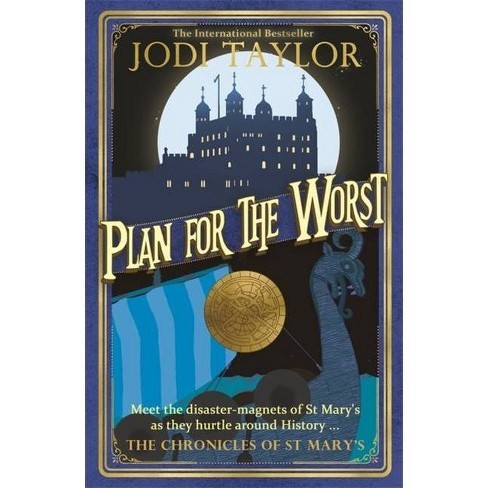 https://www.amazon.com/Plan-Worst-Jodi-Taylor/dp/147226679X
https://www.amazon.com/Plan-Worst-Jodi-Taylor/dp/147226679XTaylor’s approach to the dictates of capital-H History is similar to Willis’s, but is both more and less mystical. If you go back in time and foul up history in Taylor’s world, one of two things will happen. First, you won’t be able to, in that capital-H History will make sure that you don’t. Somehow. And if that isn’t enough to settle your hash, Taylor invents an even farther-future institution known as the Time Police, who will be more than happy to ruin your entire day for you.
How this works is open not only to interpretation but to the demands of the plot. It is okay (to use an example from this installment) to go back and tour the Tower of London to get a glimpse of the Princes in the Tower, before their mysterious disappearance. That you can do, as long as you take precautions. You can even surreptitiously film them, for historical reference. But if you actively try to change history, then History will retaliate, unless the Time Police get you first. (This is slightly more coherent than other variants on the same principle — like “Quantum Leap,” which allowed for small-scale changes authorized by, well, basically, God, or “Hot Tub Time Machine,” which allows one of its lead characters to basically rewrite history in favor of his friends.)
Anyway, without giving too much away, the entire structure of Plan For the Worst is tied closely to the idea of historical determinism. In Taylor’s case, this results in the characters making bad and wrong decisions because that is what they believe that they are supposed to do at the time. And the only reason that this doesn’t blow up spectacularly in the faces of the characters is that, yup, what they do was exactly what they had done in the past of characters on other timelines. (If this is confusing, then I am sorry about that.)
What I want to do with this little not-review is to not so much critique either book (The Mirror and the Light is perfectly well-done; Plan For the Worst is consistent with the rest of the series, which means that it balances out the silly elements with solid history and tightly-written action scenes) but to point out historical determinism as something for writers to watch out for, and to plan for. If you know something is coming your way as a historical inevitability, best to plan your way around it without having to disturb the fabric of history more than is strictly necessary.
March 9, 2020
Fred Jones Revs Up The Mystery Machine
Hey, guys. What’s up?
So, look, I know it’s been a while. A lot of water under the
old bridge, you might say.
Haven’t been here since you guys moved in, come to think of
it. It looks like they upgraded it a little. One assisted living place is
pretty much like another, I guess. I moved into one about four months ago,
after we sold the mansion.
So look, Shaggy, Velma, I guess that I need to be straight
with you about this. I didn’t just come over here to shoot the breeze.
It’s like this. My nephew Martin—you remember Martin, right?
He graduated from Oregon State about two years ago. And he inherited this
spooky old amusement park, right on the Oregon coast, a few miles south of
Portland. It had been abandoned for years. Martin’s great-uncle on his mom’s
side had owned it until it went out of business. He died last year, and Martin
has been thinking about selling the property to pay off his student loans.
Smart kid, right? He had a deal put together with this real-estate developer,
who was going to buy the whole property and raze the whole park and put in a
mixed-density development.
Honestly, Velma, I don’t know if this counts as
gentrification or not. I think they were trying to do something environmentally
sustainable? I don’t know if that counts or not. It’s Portland, they have to do
something like that.
But then there was another buyer who came in, who wanted to preserve
the old amusement park. And it turned into a bidding war. So Martin was
thinking not only would he have enough to pay off his student loans, but he’d
be able to buy an old truck and start a Hawaiian shaved-ice business. Like I
said, smart kid.
It’s like snow cones. I think. Anyway, it’s really
profitable.
I am getting to the point, Velma. So, right, sure enough,
reports start coming in that there’s a ghost on the property. Turns out some
kid died when he stood up on the roller coaster. How dumb is that? Anyway, the
two developers start thinking that it’s haunted. One of them drops out, and the
other one is making a real low-ball offer to Martin now.
So, what I was thinking was that, you know, we might go
investigate.
I’m not hungry, Shag. What are those, anyway? CBD gummies?
Might have known.
So, listen. I got the Mystery Machine up and running again.
I thought, maybe, if you two wanted, we could all go out there and investigate?
You know, like the old days. Just the three of us in the old Mystery Machine?
What do you think?
No, Daphne’s not coming. I mean, look. I already asked her.
But she turned me down when I wanted to start that podcast, and there were a
lot of hurt feelings already. It’s been tough sustaining that relationship.
That’s all I can really say. But if the three of us all go, I mean, that would
be really fun, wouldn’t it?
Okay, no. It’s not the actual Mystery Machine. I sold it out
for scrap metal five years ago. There wasn’t any way it was going to pass
modern emission standards, and the floor was all rusted out. So, what I did was
I asked around at the assisted living place, and Khalid—he’s one of the
orderlies—offered to take us out there in one of the center’s van. And he’s OK
if we call it the Mystery Machine, just for this trip. I don’t see well enough
to drive at night anyway, so he’ll drive us up there and back. What do you say?
Velma, look, I know you’re really politically involved right
now. But this is important, too. We’re talking about a young man’s future.
Isn’t that what’s at stake right now?
Sure. Yeah. It’s probably one of the developers, pretending
to be a ghost. I get that. How many times have we done this? It’s always the
developer, or some other minor character you’re not supposed to expect. All we
do is what we usually do, drive up there, stumble around, and catch the ghost
in the act.
I asked Khalid about this, and he said there is room for
your scooter in the back of the van. The Mystery Machine, I mean.
So, what do you say?
I am not asking for much here. And I don’t think I can do it
without you two. We were a great team, back in 1969, and just because we’re all
a little bit older doesn’t mean that we can’t saddle up, one more time, to
solve a mystery and help someone. All right? Who’s with me.
Okay. Thanks. Thanks so much. And Shaggy? We can’t take the
dog this time. Khalid is allergic.
February 23, 2020
Release Week Updates
As you may have guessed, this was the release date for A CIRCLE OF FIRELIGHT. Some initial thoughts:
One thing that I did not fully think maybe all the way through is waiting quite so long for the release date; if I had to do it all over again I would have put the book out in December, right after the Kirkus and PW reviews came out. The problem is that you can’t post Amazon reviews now until after the release date, so everyone that wrote a review on Goodreads couldn’t cross-promote it to Amazon. So there’s no advantage to waiting, unless you have a lot of Kindle pre-orders…Which I did not get.Having said that, I am (quite unaccountably) selling a lot, and I mean a LOT of print books. Like, probably more print books than I’ve sold for anything else (except the picture book IF MY NAME WAS AMANDA, which of course works better in book form). This is good! But Ingram won’t tell me who is buying them. I don’t think it’s all Amazon, but then who?
Only other thing to point out is that I did a review of a book called THE CACTUS LEAGUE, which you can read on Bookreporter.com.
February 1, 2020
GOODREADS GIVEAWAY – A CIRCLE OF FIRELIGHT
So right now, as I write this, I have a big box of books in my office, and an even bigger box of padded envelopes, and I need to, you know, get all this stuff out of my office, so I am doing a Goodreads giveaway to accomplish that. Sign up for the giveaway! Read my book! Say good things about it! Tell your friends.
.goodreadsGiveawayWidget { color: #555; font-family: georgia, serif; font-weight: normal; text-align: left; font-size: 14px;
font-style: normal; background: white; }
.goodreadsGiveawayWidget p { margin: 0 0 .5em !important; padding: 0; }
.goodreadsGiveawayWidgetEnterLink {
display: inline-block;
color: #181818;
background-color: #F6F6EE;
border: 1px solid #9D8A78;
border-radius: 3px;
font-family: "Helvetica Neue", Helvetica, Arial, sans-serif;
font-weight: bold;
text-decoration: none;
outline: none;
font-size: 13px;
padding: 8px 12px;
}
.goodreadsGiveawayWidgetEnterLink:hover {
color: #181818;
background-color: #F7F2ED;
border: 1px solid #AFAFAF;
text-decoration: none;
}
Goodreads Book Giveaway

A Circle of Firelight
by Curtis Edmonds
Giveaway ends February 14, 2020.
See the giveaway details
at Goodreads.
Enter Giveaway
KIRKUS REVIEWS – A CIRCLE OF FIRELIGHT
My new book, A CIRCLE OF FIRELIGHT (Amazon, B&N, your local independent bookstore), comes out on February 20, 2020. I sent an advanced copy to the nice people at Kirkus Reviews, and they did a review. Which was a nice thing for them to do.
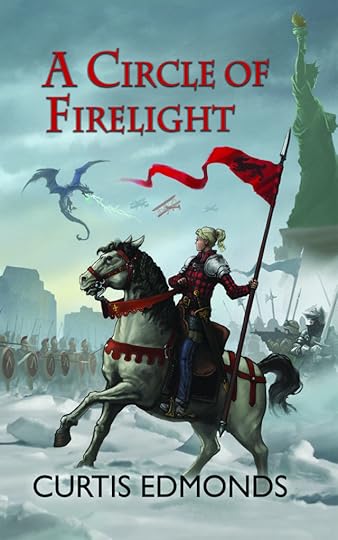
You can read the whole review here, but here are a couple of excerpts to help you understand why you should, I mean, you know, buy the book right away, because that would be the right thing to do and also because it would help me cover my costs and stuff, because writing and editing and getting a fantastic cover isn’t cheap, yo.
The life of Ashlyn Revere has stalled. Two months after graduating from college, Ashlyn is still searching for her break in publishing while living at home with her parents and three siblings. One of those is her sarcastic, fragile teen sister, Penny, who has battled cystic fibrosis her entire life. Their world changes forever when Penny stows away in Ashlyn’s car during a trip to a job interview and they are involved in a multicar accident. The sisters are left comatose and hospitalized. Ashlyn awakens in a fantasy realm called Summervale, which is ruled by the Dark Lord.
The author effectively alternates between the medical drama in the real world and the fantastical happenings in the sisters’ dreamscapes, heightening the tension. What Edmonds does especially well is to sprinkle fantasy and pop-culture references throughout, making the volume accessible even to readers who aren’t genre fans. What results is a charming tale that allows every reader to smile knowingly.
A sturdy, well-crafted, and vibrant fantasy.
January 18, 2020
The Road Goes On Forever: A Not-So-Crazy Proposal to Fix the National Football League
All I am asking is that you hear me out for a minute. I know this sounds crazy. My wife has already told me it sounds crazy, so I don’t need to hear that from you. And, I get it, adding two teams to the NFL that do not, actually, have stadiums or fan bases or even practice facilities and asking them to play 17 road games a year, at first blush, sounds crazy. Not just crazy, but actually indicative of a deep-seated mental problem. Be that as it may. Just stick with me for a minute.
 This message was not brought to you with the permission of the Office of the Commissioner.
This message was not brought to you with the permission of the Office of the Commissioner.One of the strengths of the National Football League is that, currently, it has 32 teams. This matters more than you might think. A 32-team NFL, playing a 16-game season, means that each team can have a predictable schedule, not just for the 2020 season, but for the next century. The Dallas Cowboys, next year, will play the three other NFC East teams twice, will play all four of the AFC North teams, and all four of the NFC West teams. The only two games that weren’t set in stone were determined once the Cowboys, um, completely gave the NFC East to the Eagles; the Cowboys will be playing the second-place Falcons and Vikings instead of the first-place Saints and Packers, and this is probably to the good. But the point of all of this is that you know, for 14 of the 16 games, exactly who any NFL team will play each year.
While this is a very nice thing for the NFL, having this kind of balance means that it’s hard to expand. The NFL had similar growing pains going from 30 teams to 31 teams (requiring that at least one team sit out every week) which it fixed in going to 32. But going to 33 or 34 teams, no matter how much the NFL would like to do that, will interrupt the carefully laid-out schedule.
Add to that the fact that the NFL would like to move to an 18–week schedule. Currently, the NFL plays 16 games over 17 weeks, with one bye week per team (the scourge of fantasy football owners everywhere). The NFL, and a lot of fans, would not mind at all if there were, say, one or two pre-season games and a 17-game schedule being played out over 19 weeks with two bye weeks. But, again, adding games to the NFL season fouls up the near-perfect alignment of the schedule.
So this is my not-so-crazy idea. The NFL should:
 Well, it looks better than the Browns logo.
Well, it looks better than the Browns logo.Add two teams to the NFL, one in the NFC and one to the AFC. I would like one of the two teams to be named the Canton Bulldogs, to honor one of the founding NFL franchises and the home of the Pro Football Hall of Fame, but that’s just me. You can choose one of the other founding teams, like the Rock Island Independents, just because of their awesome uniforms, but whatever. Call them the London Monarchs. Whatever.
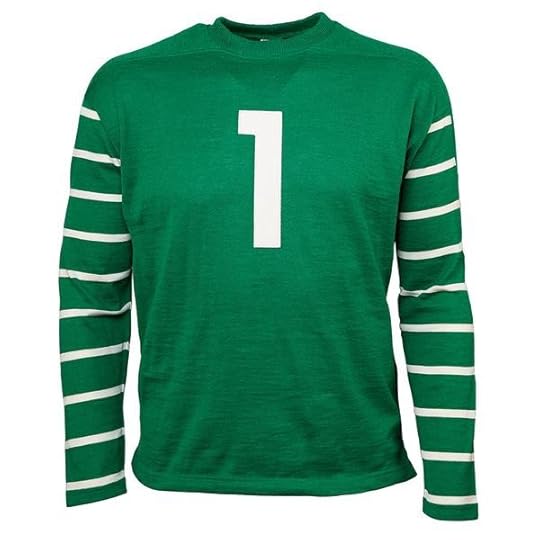 I mean, COME ON. Look at that.
I mean, COME ON. Look at that.2. So these two teams are, well, a little different from any other NFL team. How, you say?
3. Well, as you probably guessed already, the teams do not actually play in Canton or Rock Island, or in fact, anywhere. Why is this important?
4. This is important because these are road teams. This means that they never have any home games. They play every game in the road. They don’t have a stadium or a fan base or (this is key) an owner; they would be managed by the league.
5. As such, a league-appointed general manager would set up the rosters and a league-appointed coaching staff would coach the teams.
6. The Canton team would be in the NFC and would play each of the 16 NFC teams in their home stadiums. The AFC road team would do the same in the AFC. (Then the two road teams would meet in a neutral site to play each other the last week of the season.)
7. The road teams would get no draft picks. (So if they go 1–16, it doesn’t matter.) They would be working with minimal budgets, so no pricey free agents. The other NFL teams would be able to designate a player or two to play with a road team on a developmental basis (similar to what some teams did with the old World League).
8. This would probably — almost certainly — make these teams very, very bad indeed. But they could still make the playoffs as a wild-card (they wouldn’t be part of any division so they couldn’t ever be division champions).
What are the benefits of doing this?
First, every other NFL team now would have nine home games instead of eight, which automatically improves revenue by 12%. (This is offset by the loss of one preseason game.) This takes advantage of one of the most under appreciated problems with the league — that so many stadiums are empty half the year. This also may help a little with overall scheduling because you can shift around the road teams any old way.
Second, adding two road teams gives more players the chance to start in the NFL without displacing older players or diluting the overall product. The talent stays concentrated in the league, but the players on the road team can develop instead of being stashed on a practice squad.
But most importantly, I think, is the idea that the road teams would be a whole lot of fun.
Why would that be the case? Part of it would be that the road teams would be so undermatched in talent that they would have to resort to, well, trickeration. Different schemes. Wildcat formations. Why not? They would have nothing to lose. And as such, the NFL might hire coaches that were a little unorthodox. Tell me it wouldn’t be a lot of fun to see the NFL hire Mike Leach to run the Oakland Pirates or whatever you ended up calling these teams. (I realize this is a longshot; in the unlikely event the NFL ever implements this idea, it would hire some boring non-entity like Mike Shula or Dave Wannstedt to run the teams. But you can hope.)
And then secondly, well, how do you think that the American football-watching public will take to these teams? One thing the NFL doesn’t really have right now is underdogs. Nobody sees, for example, the Cleveland Browns or Detroit Lions as underdogs — they’re generally thought of as bad teams with bungling front offices. A lot more people would cheer for the Browns and Lions to go 0–16 (including some of their fans).
But these teams? You have to think that if the Canton Bulldogs play the New York Giants, there are going to be a whole lot of people cheering for the Canton Bulldogs (at least in Dallas). Any games that these road teams win are going to be terribly embarrassing for the loser — and very endearing for the road teams. It would be an event — like Appalachian State beating Michigan, or like Stephen F. Austin beating Duke in basketball. I am not saying you will ever have a lot of fans of these road teams, but (especially if they play fun) they would be a lot of fun to cheer for.
Why It Won’t Work
The owners won’t like it. These new franchises would have next to no value — and in theory, this would bring down the value of their franchises. And — yeah — maybe the road teams dilute the value of the product some, maybe it’s a little harder to sell tickets to a Jaguars-Monarchs game, even if it’s close to a guaranteed win for the Jaguars.
The league won’t like it. Running two teams is kind of a conflict of interest for the league, and it’s a huge administrative headache. Even running the road teams on a shoestring, the costs might be more than the revenue brings in — especially if ticket sales go down for these games.
The networks won’t like it. They might like having more games, but maybe not these particular games. You’re not going to see Troy Aikman or Joe Buck calling a lot of Canton Bulldogs games.
And the real reason — the union won’t like it. Even though it creates a lot of jobs, it doesn’t create good jobs — and by creating more opportunities, it creates opportunities for current players to lose their jobs to upstarts from the road teams. Add to that the fact that the unions don’t want the 17th game or the 18th week (even with the two byes), the whole thing is practically a non-starter.
So it’s crazy. But I still think it’s crazy enough to work. And it’s not like the NFL hasn’t done worse.
The Road Goes On Forever: A Not-So-Crazy Proposal to Fix the National Football League (Seriously…
All I am asking is that you hear me out for a minute. I know this sounds crazy. My wife has already told me it sounds crazy, so I don’t need to hear that from you. And, I get it, adding two teams to the NFL that do not, actually, have stadiums or fan bases or even practice facilities and asking them to play 17 road games a year, at first blush, sounds crazy. Not just crazy, but actually indicative of a deep-seated mental problem. Be that as it may. Just stick with me for a minute.
 This message was not brought to you with the permission of the Office of the Commissioner.
This message was not brought to you with the permission of the Office of the Commissioner.One of the strengths of the National Football League is that, currently, it has 32 teams. This matters more than you might think. A 32-team NFL, playing a 16-game season, means that each team can have a predictable schedule, not just for the 2020 season, but for the next century. The Dallas Cowboys, next year, will play the three other NFC East teams twice, will play all four of the AFC North teams, and all four of the NFC West teams. The only two games that weren’t set in stone were determined once the Cowboys, um, completely gave the NFC East to the Eagles; the Cowboys will be playing the second-place Falcons and Vikings instead of the first-place Saints and Packers, and this is probably to the good. But the point of all of this is that you know, for 14 of the 16 games, exactly who any NFL team will play each year.
While this is a very nice thing for the NFL, having this kind of balance means that it’s hard to expand. The NFL had similar growing pains going from 30 teams to 31 teams (requiring that at least one team sit out every week) which it fixed in going to 32. But going to 33 or 34 teams, no matter how much the NFL would like to do that, will interrupt the carefully laid-out schedule.
Add to that the fact that the NFL would like to move to an 18–week schedule. Currently, the NFL plays 16 games over 17 weeks, with one bye week per team (the scourge of fantasy football owners everywhere). The NFL, and a lot of fans, would not mind at all if there were, say, one or two pre-season games and a 17-game schedule being played out over 19 weeks with two bye weeks. But, again, adding games to the NFL season fouls up the near-perfect alignment of the schedule.
So this is my not-so-crazy idea. The NFL should:
 Well, it looks better than the Browns logo.
Well, it looks better than the Browns logo.Add two teams to the NFL, one in the NFC and one to the AFC. I would like one of the two teams to be named the Canton Bulldogs, to honor one of the founding NFL franchises and the home of the Pro Football Hall of Fame, but that’s just me. You can choose one of the other founding teams, like the Rock Island Independents, just because of their awesome uniforms, but whatever. Call them the London Monarchs. Whatever.
 I mean, COME ON. Look at that.
I mean, COME ON. Look at that.2. So these two teams are, well, a little different from any other NFL team. How, you say?
3. Well, as you probably guessed already, the teams do not actually play in Canton or Rock Island, or in fact, anywhere. Why is this important?
4. This is important because these are road teams. This means that they never have any home games. They play every game in the road. They don’t have a stadium or a fan base or (this is key) an owner; they would be managed by the league.
5. As such, a league-appointed general manager would set up the rosters and a league-appointed coaching staff would coach the teams.
6. The Canton team would be in the NFC and would play each of the 16 NFC teams in their home stadiums. The AFC road team would do the same in the AFC. (Then the two road teams would meet in a neutral site to play each other the last week of the season.)
7. The road teams would get no draft picks. (So if they go 1–16, it doesn’t matter.) They would be working with minimal budgets, so no pricey free agents. The other NFL teams would be able to designate a player or two to play with a road team on a developmental basis (similar to what some teams did with the old World League).
8. This would probably — almost certainly — make these teams very, very bad indeed. But they could still make the playoffs as a wild-card (they wouldn’t be part of any division so they couldn’t ever be division champions).
What are the benefits of doing this?
First, every other NFL team now would have nine home games instead of eight, which automatically improves revenue by 12%. (This is offset by the loss of one preseason game.) This takes advantage of one of the most under appreciated problems with the league — that so many stadiums are empty half the year. This also may help a little with overall scheduling because you can shift around the road teams any old way.
Second, adding two road teams gives more players the chance to start in the NFL without displacing older players or diluting the overall product. The talent stays concentrated in the league, but the players on the road team can develop instead of being stashed on a practice squad.
But most importantly, I think, is the idea that the road teams would be a whole lot of fun.
Why would that be the case? Part of it would be that the road teams would be so undermatched in talent that they would have to resort to, well, trickeration. Different schemes. Wildcat formations. Why not? They would have nothing to lose. And as such, the NFL might hire coaches that were a little unorthodox. Tell me it wouldn’t be a lot of fun to see the NFL hire Mike Leach to run the Oakland Pirates or whatever you ended up calling these teams. (I realize this is a longshot; in the unlikely event the NFL ever implements this idea, it would hire some boring non-entity like Mike Shula or Dave Wannstedt to run the teams. But you can hope.)
And then secondly, well, how do you think that the American football-watching public will take to these teams? One thing the NFL doesn’t really have right now is underdogs. Nobody sees, for example, the Cleveland Browns or Detroit Lions as underdogs — they’re generally thought of as bad teams with bungling front offices. A lot more people would cheer for the Browns and Lions to go 0–16 (including some of their fans).
But these teams? You have to think that if the Canton Bulldogs play the New York Giants, there are going to be a whole lot of people cheering for the Canton Bulldogs (at least in Dallas). Any games that these road teams win are going to be terribly embarrassing for the loser — and very endearing for the road teams. It would be an event — like Appalachian State beating Michigan, or like Stephen F. Austin beating Duke in basketball. I am not saying you will ever have a lot of fans of these road teams, but (especially if they play fun) they would be a lot of fun to cheer for.
Why It Won’t Work
The owners won’t like it. These new franchises would have next to no value — and in theory, this would bring down the value of their franchises. And — yeah — maybe the road teams dilute the value of the product some, maybe it’s a little harder to sell tickets to a Jaguars-Monarchs game, even if it’s close to a guaranteed win for the Jaguars.
The league won’t like it. Running two teams is kind of a conflict of interest for the league, and it’s a huge administrative headache. Even running the road teams on a shoestring, the costs might be more than the revenue brings in — especially if ticket sales go down for these games.
The networks won’t like it. They might like having more games, but maybe not these particular games. You’re not going to see Troy Aikman or Joe Buck calling a lot of Canton Bulldogs games.
And the real reason — the union won’t like it. Even though it creates a lot of jobs, it doesn’t create good jobs — and by creating more opportunities, it creates opportunities for current players to lose their jobs to upstarts from the road teams. Add to that the fact that the unions don’t want the 17th game or the 18th week (even with the two byes), the whole thing is practically a non-starter.
So it’s crazy. But I still think it’s crazy enough to work. And it’s not like the NFL hasn’t done worse.



